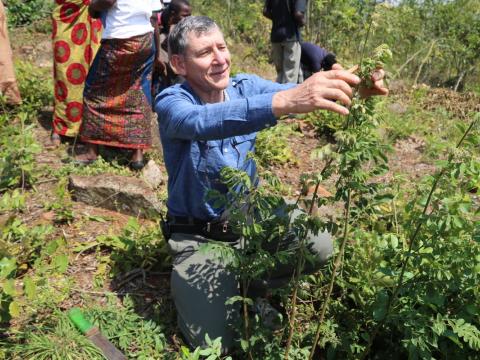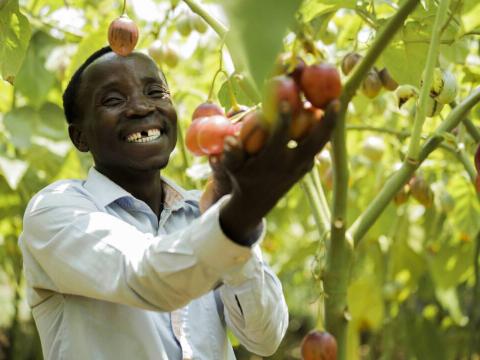
Why does a child-focused organization like World Vision care about trees?
As Tony Rinaudo prepares for this year’s UN Climate Meetings, he thinks back on his work in Farmer Managed Natural Regeneration (FMNR) and how renewing forests has benefited children, their families, and their communities.
Deforestation affects children
Our guide was speechless. It had been only two years since he had visited his home area. In that short time, what had been a dense forest that even adults were scared to enter had been completely razed. Two boys with the backdrop of bare hills caught my attention. Did they understand why their mother had to walk for hours to collect firewood, why their village well had dried, why they were too poor to go to school, why droughts were more common and they were regularly hungry, or why their father was often away - looking for work in a distant city? What did their future hold?
World Vision, a child-focused organization, works to improve the lives of the world’s most vulnerable people. Deforestation, land degradation, and climate change directly impact child well-being – in multiple ways
- Making it harder to grow food and increasing malnutrition and poverty
- Children are less likely to go to school as their parents can’t afford it and their labour is needed
- Families unable to meet their needs from the land are more likely to move – making them even more vulnerable to exploitation and abuse
- Some families resort to marrying their daughters too young jeopardizing their health, safety and future prospects
One significant way in which World Vision addresses these problems is through promoting a method of reforestation called Farmer Managed Natural Regeneration (FMNR). Ironically, it does not involve tree planting! FMNR simply involves the selection and management of trees and shrubs growing from living tree stumps, roots and dormant seeds. This method is cheap and scalable and has multiple benefits – increased food production, fuelwood and building timber, wild foods, and traditional medicines. The trees also help buffer against extreme weather events and help communities become more resilient against climatic shocks.
Trees improve people’s lives
Communities least able to cope with climatic disasters are experiencing increased frequency and severity of droughts, floods, and severe storms. High temperatures negatively impact people – their health and productivity, but also their crops and livestock. Changes in traditionally stable weather patterns make it increasingly difficult for Farmers to know what to plant and when to plant. Climate change is making it harder to survive.
The good news is that FMNR helps both mitigate against climate change by drawing down carbon dioxide from the atmosphere and helps people adapt – by reducing temperatures and windspeeds, reducing the impact of drought and the likelihood of heavy flooding and providing alternative livelihood sources such as timber, honey, fodder and wild foods. This diversification means that farmers are much more resilient when climatic shocks do occur.
Musa Chelelgo’s story is not atypical. Musa, from Kiambogoko district in Nakuru county in Kenya, was a struggling farmer. Musa’s farm yielded meagre harvests even in good years, and in 2009 he lost five head of cattle due to drought, despite desperately walking them long distances in search of fodder. To feed his family and pay school fees, Musa would leave home in search of day labour. When he did find work, he was lucky to earn just US$2.00 per day, barely enough to be worthwhile.. Musa’s wife, along with the other village women would regularly walk 10 kilometres to the Ebulu forest reserve to collect fuel wood and accelerate deforestation. This exhausting, repetitive work prevented her from participating in other more productive activities. Musa, and his wife, did not see the farm as providing a sustainable living, let alone become a profitable enterprise.
In 2012, World Vision began promoting FMNR in his district and Musa adopted the practice. Because of the beneficial impact of the trees, milk production from his cows almost doubled, grain yields increased and he added beekeeping to his farm activities. Musa joined a savings and loans group and is now able to invest in further improvements such as fencing and better seed. Most importantly, he can afford to send his children to school. Musa says that “FMNR has opened my horizons to be a farmer and to adopt innovation”.
He continued, “Before, the farm wasn’t much more than a place to live and it had low productivity and in fact was a liability as I regularly lost my cows during drought. I did not see farming as a viable way to meet my family’s needs. Today I have a growing and thriving business which supports my family.”
Climate change is everybody’s problem
If the slow progress of the UN Climate Change meetings has taught us anything, it is that more needs to be done by all of us. The terrible droughts, floods, extreme storm events and wildfires being experienced, even in unexpected parts of the world affect everyone, but affect the poor and vulnerable the most. We can no longer leave it up to governments and industry to tackle climate change alone – progress thus far is too slow.
But, each and every one of us is capable of far more than we think and our individual contributions do count! Through our actions we can reduce our individual greenhouse gas emissions, we can influence our peers, and we can influence government and industry.
Tony Rinaudo is the Senior Climate Action Advisor for World Vision Australia.
Learn more about World Vision at COP28

